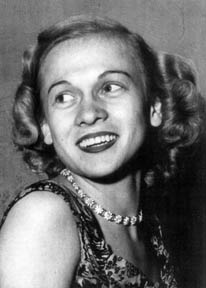
Jean Shepard, Two Whoops and a Holler.
Jean Shepard, Don't Fall in Love with a Married Man.
"I went up and I see this little mite of a girl with this big bass, and she was whacking away, and I liked her and I signed her." So said Ken Nelson, head of Capitol Records' country music division, about the night he first saw the mighty Jean Shepard.
At a time when women in country music served mainly as either muses or metaphors (honky tonk jezebels, basically) Jean Shepard took on cultural hypocrisy and adultery (lots and lots of adultery) in her songs with a smirk and a lot of fire. Along with Kitty Wells, she cleared the way for everyone from Loretta Lynn to the Dixie Chicks.
Ollie Imogene Shepard was born in Paul's Valley, Oklahoma, in 1933 at the depth of the Dust Bowl era. She, along with nine other siblings, lived in colossal poverty, in a dust-blown house without electricity or running water. The Shepards did have a radio, though, so young Jean could listen to the Grand Ole Opry, and once a year, her father bought a Jimmie Rodgers record with the pennies he had saved.
After the war, the family moved out to California, following in the wake of thousands of Okies, and when Jean was a sophomore in high school she helped found an all-girl country band, the Melody Ranch Girls, in which she sung and played bass. Because there were so few women country singers (and because Jean wasn't interested in doing "girl" numbers anyhow), the Melody Ranch Girls covered Hank Williams and Bob Wills.

By 1952, the band broke up, in part due to cultural pressures. As Jean put it years later, "the girls got to be marrying, and the husbands started getting jealous." But luckily, before the split, Hank Thompson had seen Jean play and advocated for her at Capitol Records, which signed Shepard. (Capitol was also looking to find competition for Kitty Wells.)
When she first recorded, she was 18 years old and terrified, but luckily she had a fantastic session band for her first single--the guitarists Speedy West and Jimmy Bryant (who will be turning up on "Locust St" very soon) and Cliffie Stone on bass. The result was "Twice the Lovin' (in Half the Time)", a fantastic honky-tonk number distinguished by a typically sly, dextrous steel solo by West.
In 1953, Jean had a major hit dueting with Ferlin Husky on the weepy "A Dear John Letter" and there were some at Capitol who wanted to smother Jean in tepid duets with male singers (the awful follow-up to "Dear John", "Forgive Me John", shows the road thankfully not taken), but again, she had support where it counted, from label head Nelson.
So at the tail end of '53, Jean recorded the incredible "Two Whoops and a Holler", which, while written by a man (Joseph Franklin), is about as feminist as the '50s ever got. The lyrics may have been written as a bit of a joke on the singer--listen to this gal speak her mind!--but Shepard sings it with ferocity, brilliance and a great dose of black humor; it's an astonishing performance. "Two Whoops" was recorded on December 17, 1953 and issued in April 1954 as the b-side of the vastly inferior "Why Did You Wait" (Capitol F2791).
And "Don't Fall in Love with a Married Man", recorded a few months later, showcases just how well Jean could sing traditional country. It was recorded on April 12, 1954, and issued in Sept '54 as the b-side of "You'll Come Crawlin' Back" (Capitol F2905).
Shepard's back catalog on CD is a bit of a mess. For the avid and the cash-happy, there is the 5-CD set Melody Ranch Girl. Otherwise, there is little from which to choose: Jean Shepard, a hodgepodge of later stuff; a couple of cut-rate collections that have few songs from her classic years; and one truly great compilation on CD: Honky Tonk Heroine, which collects the best of the 1952-1964 years and was issued by the Country Music Foundation in 1995 but scarcely distributed--it is available used, for a relatively steep price, but worth it.
Jean Shepard is now recording for Enormous Records--here are some of her more recent recordings.
Top photo: the '54 Studebaker.
No comments:
Post a Comment